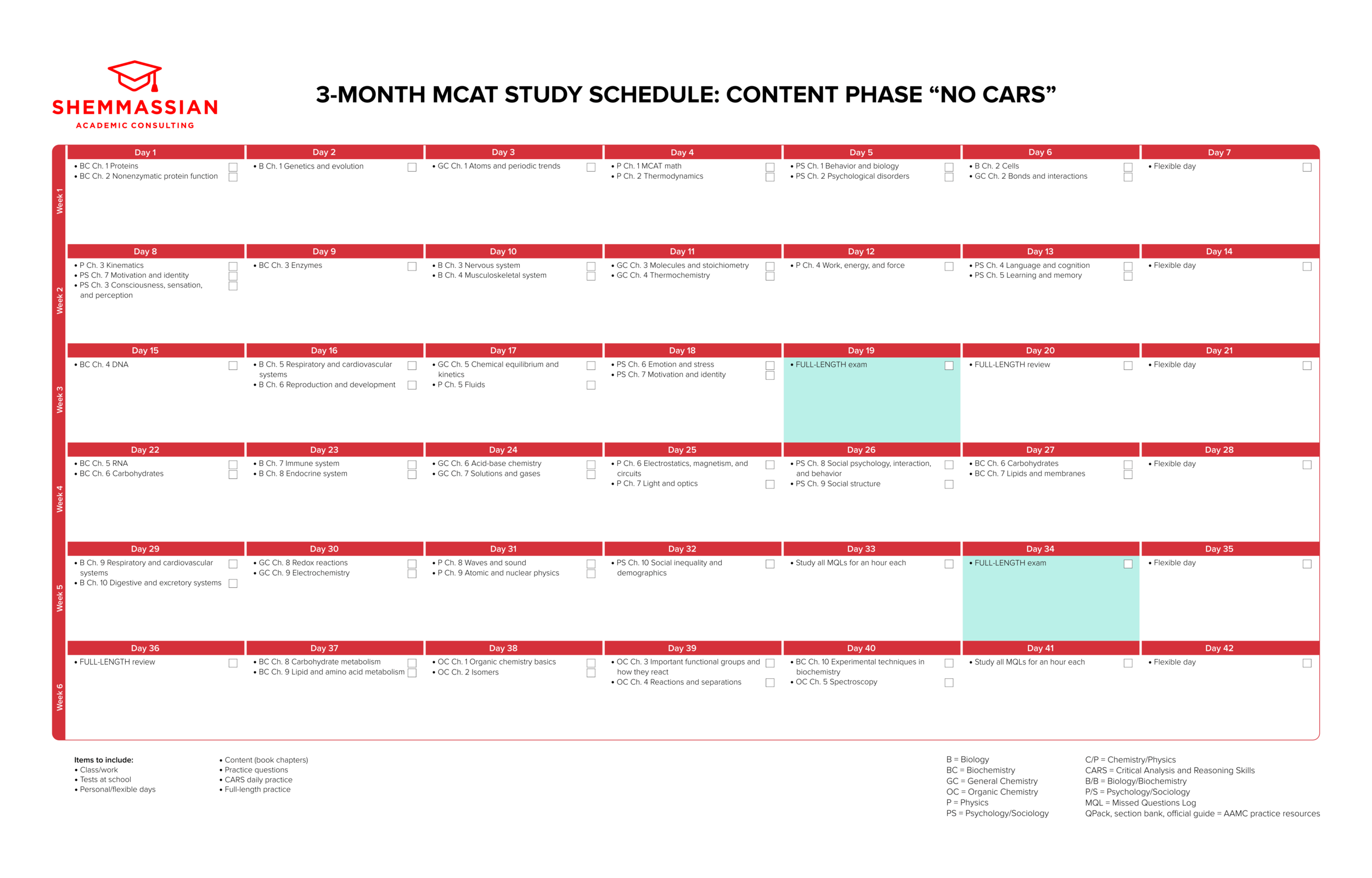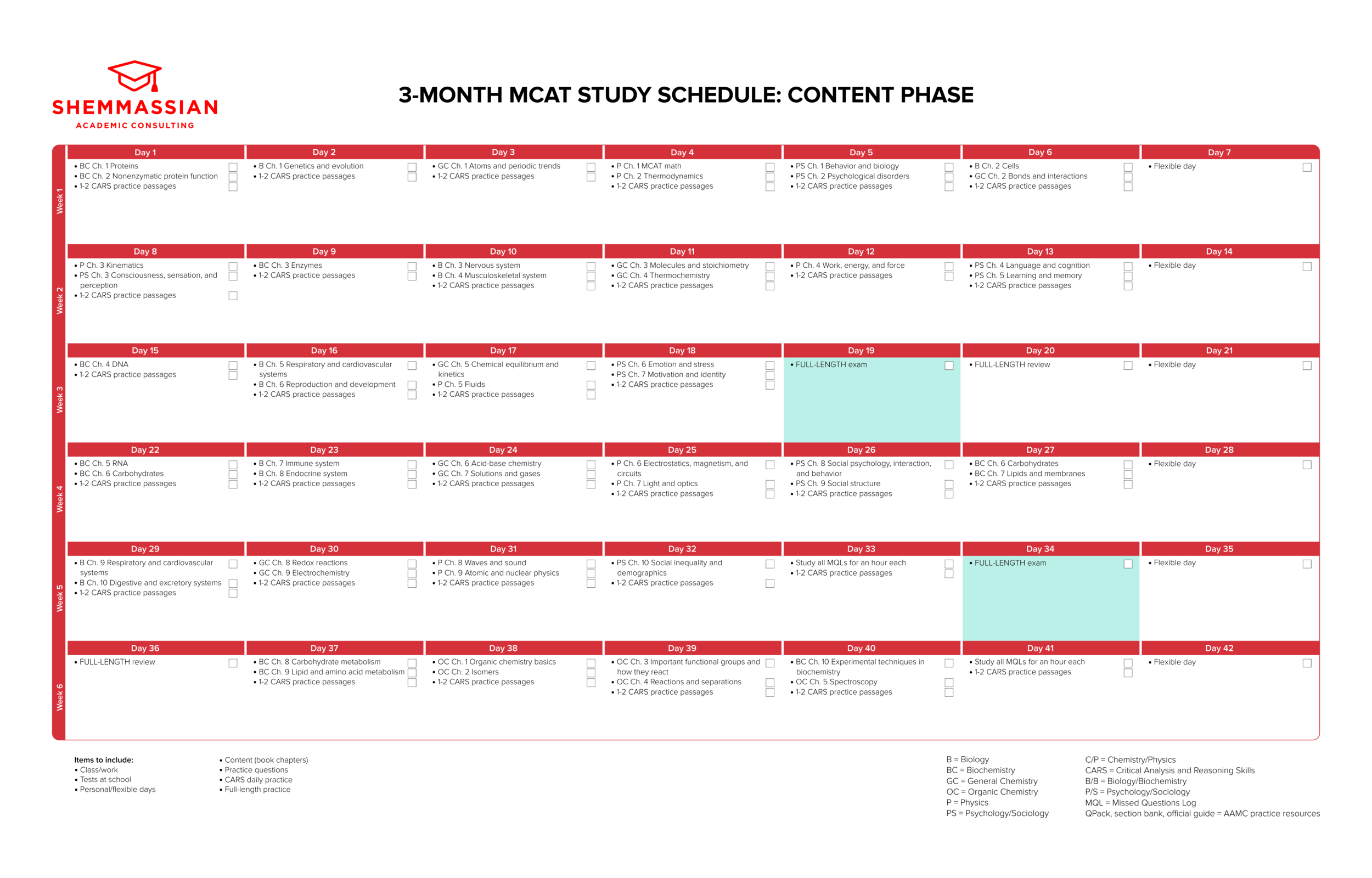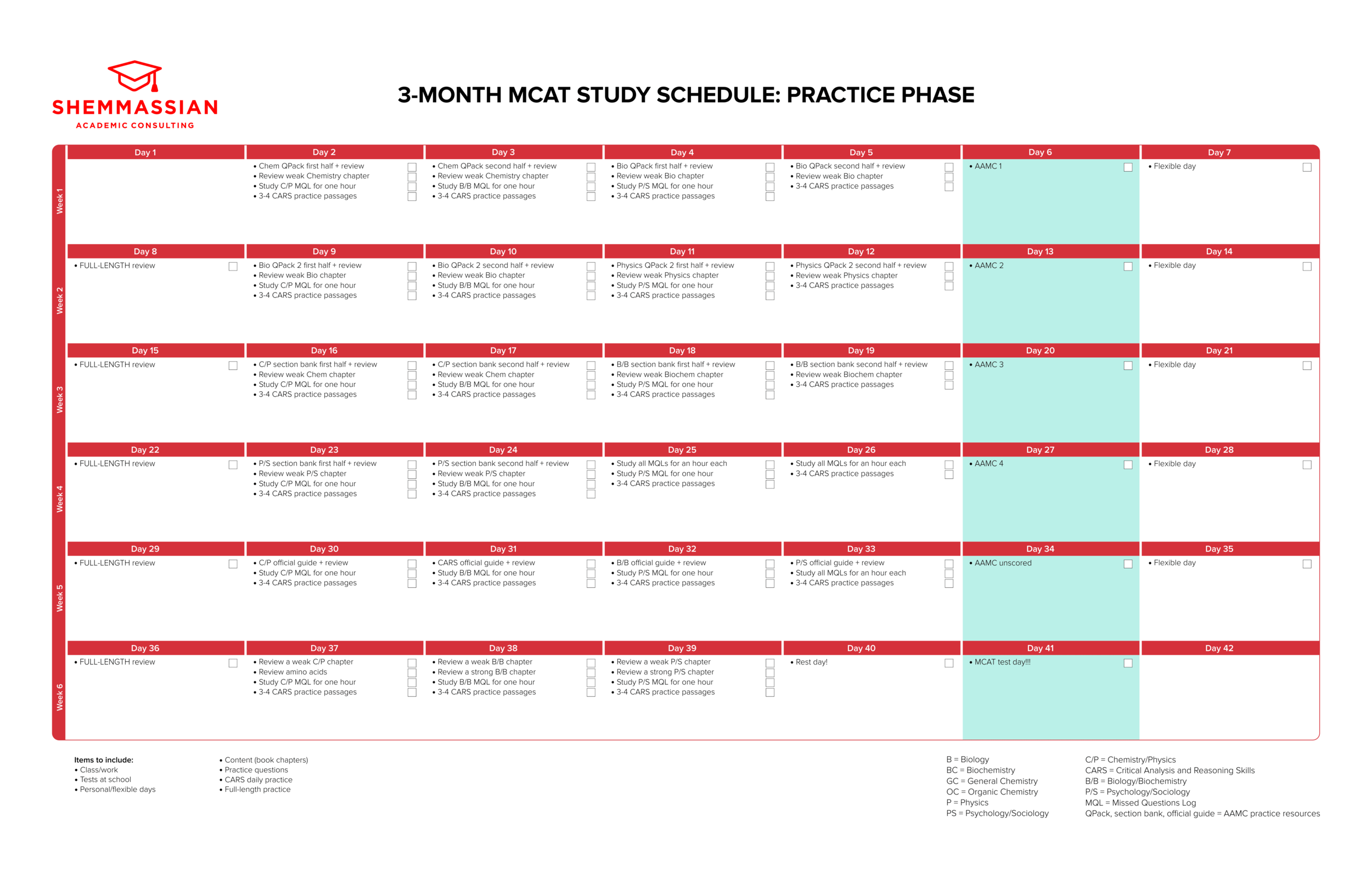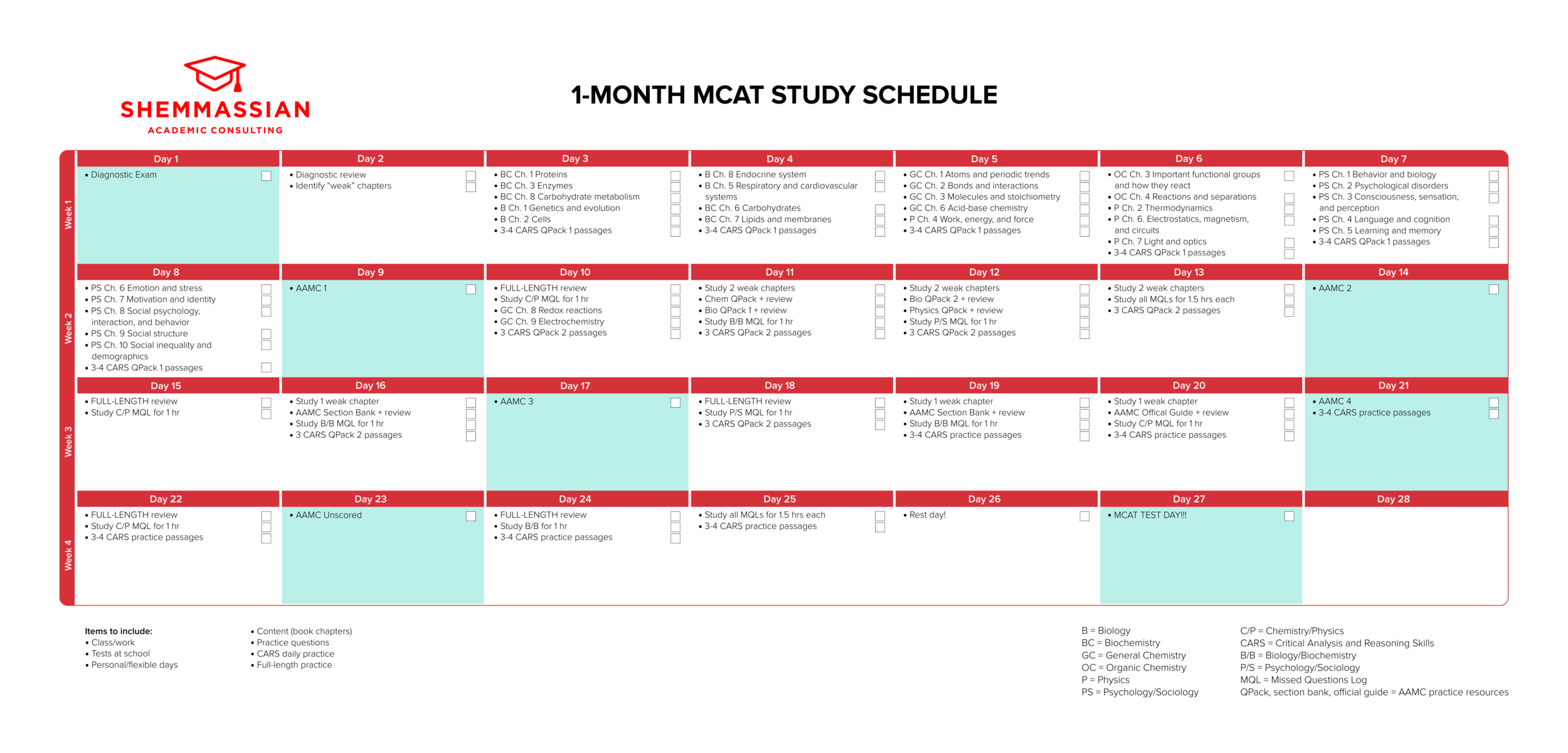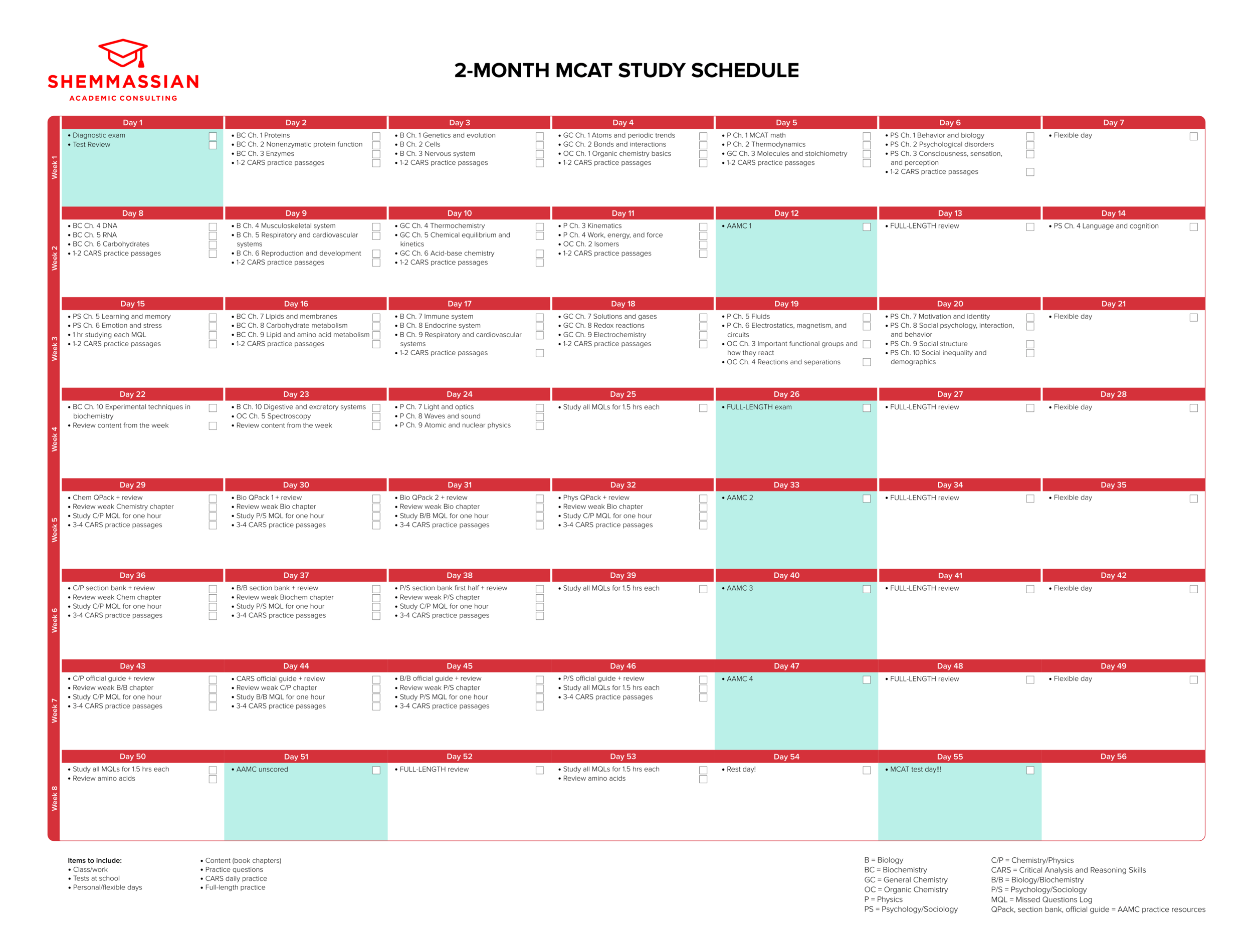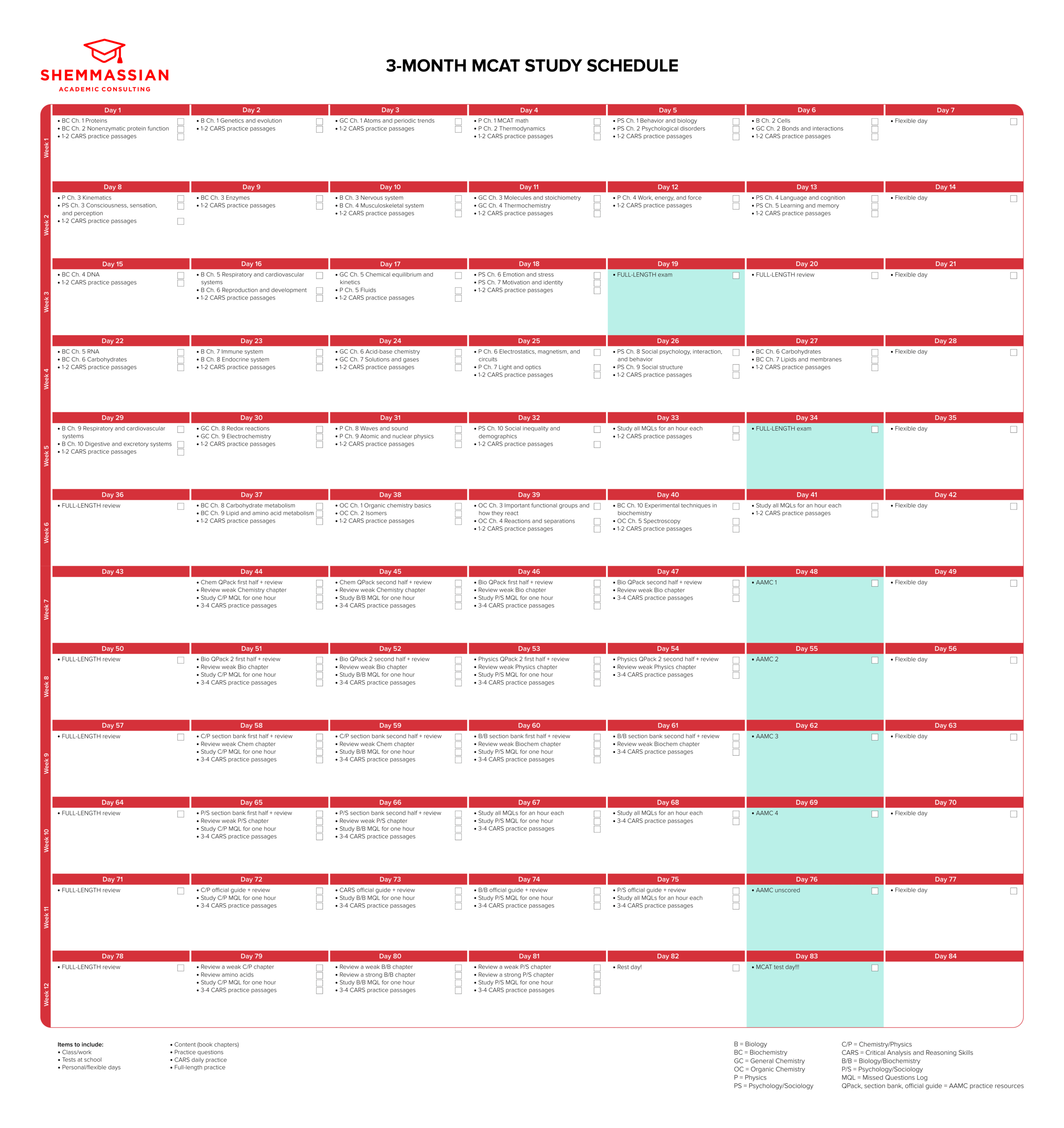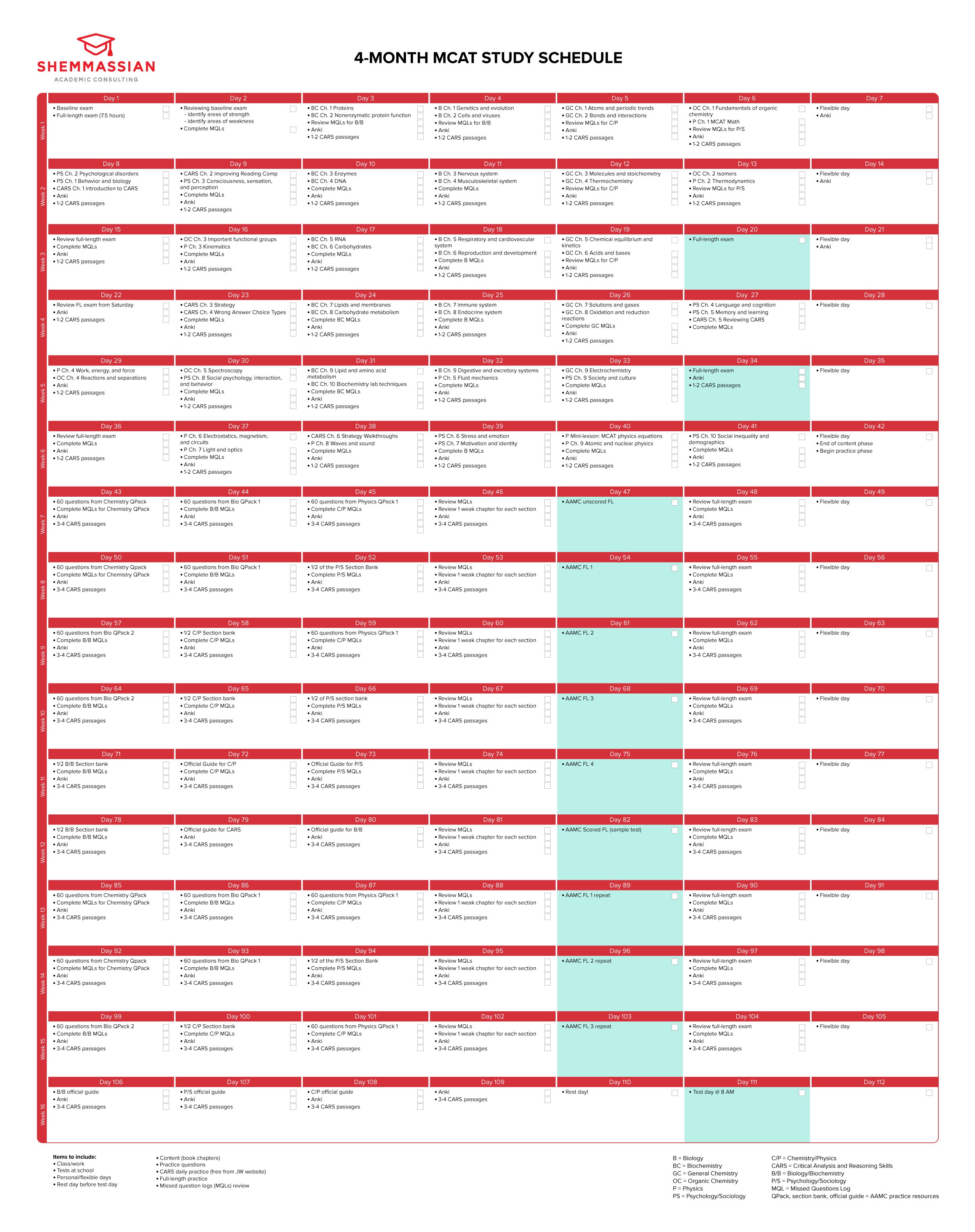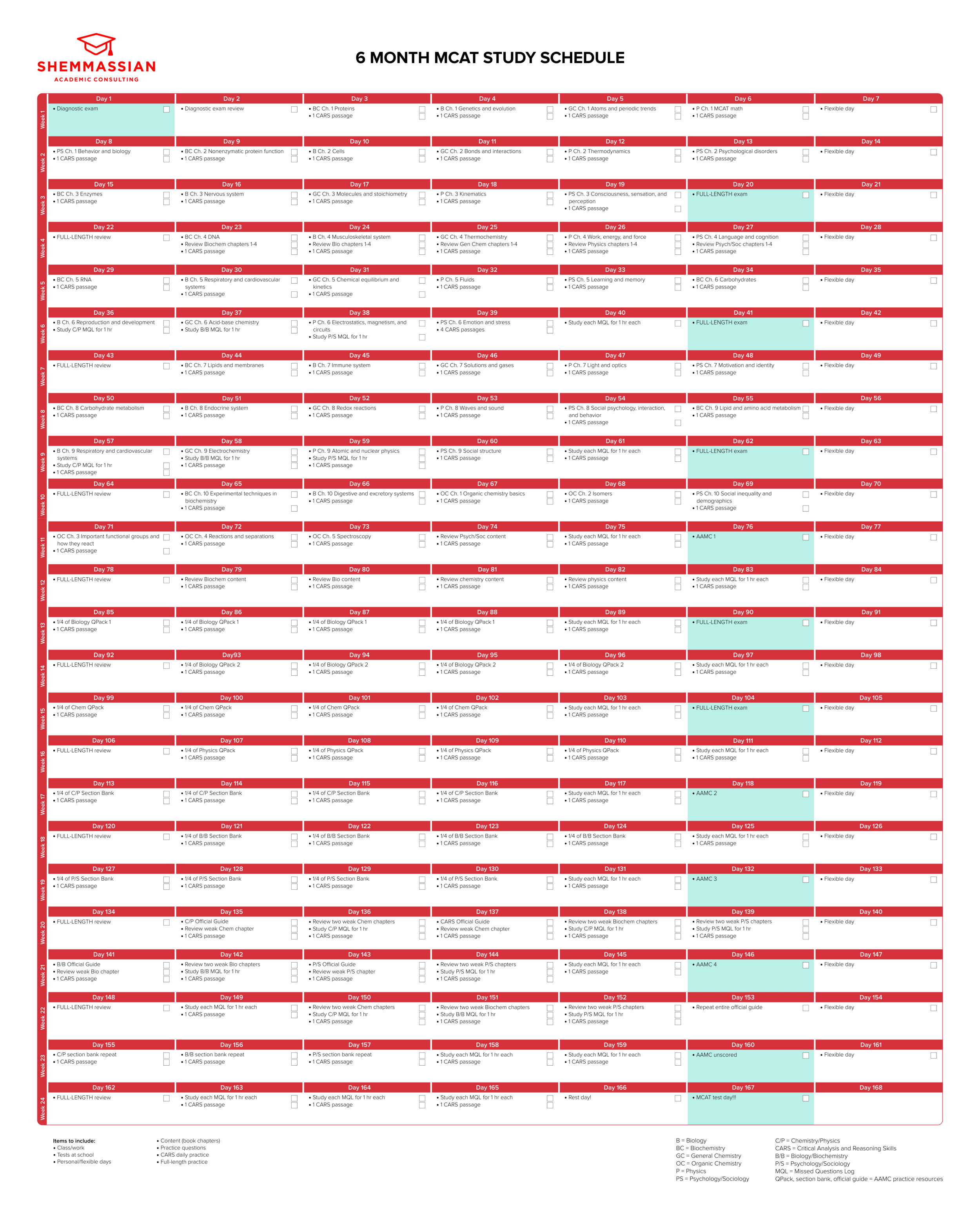The Ideal MCAT Study Schedule (1 Month | 2 Months | 3 Months | 4 Months | 6 Months)
/Use these proven MCAT study schedule templates to achieve a 520+ score, no matter how many months you have to prepare
(Note: This resource also appears in our MCAT Ultimate Guide. We recommend using it alongside our MCAT Premium Content Hub and MCAT Question Bank.)
----
Part 1: Introduction to building a great MCAT study schedule
Part 2: A step-by-step approach to building an MCAT study schedule
Part 3: MCAT study schedule templates (1 month | 2 months | 3 months | 6 months)
Part 4: Actionable advice for staying on task
----
Part 1: Introduction to building a great MCAT study schedule
You’ve probably heard stories about premed students who went to well-respected colleges, had extensive clinical and volunteer experiences, worked in the same lab for multiple years, and achieved a 3.9 GPA but were still rejected from every medical school that they applied to. Odds are these students had less-than-stellar MCAT scores, one of the most important factors admissions committees consider when evaluating applications.
If you think of medical school admissions as a tiered evaluation process, the MCAT falls in the top tier of what admissions committees look at when they evaluate an applicant, in addition to your GPA and personal statement.
Why do admissions committees care so much about the MCAT? The MCAT is an attempt to compare students who come from a broad range of backgrounds, majors, regions, undergraduate institutions, and much more.
For example, let’s say that a Stanford student and a student from a small state school have the same application, but the Stanford student scored a 505 on the MCAT while the small state school student scored a 518. The small state school student proved a high science and critical thinking aptitude, and admissions committees will likely choose the small state school student, despite the differences in the undergraduate reputation.
Here’s the bottom line: lots of otherwise qualified students don’t get into medical school because of a low MCAT score. What’s more, a large number of these low MCAT scorers didn’t dedicate sufficient time to developing a study schedule because they weren’t “ready to completely start studying” or were “just getting started in the process.”
Creating a study schedule is the single most important piece of the MCAT puzzle that you will complete at the beginning of your test prep as it serves as a roadmap, friend, and accountability tracker throughout your entire MCAT journey. Students who are thoughtful and spend the time upfront creating a solid study schedule tend to perform much better on the MCAT.
Don’t be afraid to spend a few hours designing your MCAT study schedule! It will pay off in the long run when you crush the MCAT and get that acceptance call from your dream medical school.
Let’s dive into what this guide covers and how to make an MCAT study schedule.
What this MCAT study schedule guide covers
To help you sit down and write out your own MCAT study schedule, we’ve developed a comprehensive guide that will help you achieve a 520+ score and get into medical school.
This guide will cover the following:
A step-by-step guide to building your own study schedule, which includes choosing a test date and mapping out each week until your exam
Answers to frequently asked questions about the MCAT study schedule
Example study schedules (1-month MCAT study plan, 2-month MCAT study plan, and a 3-month MCAT study plan)
Actionable advice for staying on task
After reading through this guide, you’ll have all of the information needed to build yourself an effective study schedule that helps you achieve a high score on the MCAT.
Let’s get started!
----
Part 2: A step-by-step approach to building an MCAT study schedule
Step 1: Choose an MCAT test date.
In order to build your MCAT study schedule, you’ll want to select a test date.
This is often not an easy decision to make, so there are a few questions you should ask yourself before selecting a test date.
Have you taken the classes absolutely needed for the MCAT? These classes include general chemistry, one semester of organic chemistry and physics, and introductory biology. (Note: There are also medical school prerequisites.)
What other time commitments will you have during the period in which you plan on studying for the MCAT? MCAT preparation is time consuming. You should be honest and realistic with yourself when determining your time commitments.
To assess your time, try this simple exercise.
Select your test date.
Write out every other time commitment you will have between now and your test date. These should include:
School and school studying time
Work
Volunteering
Class
Personal time
Holidays
Write out the average amount of time you will be able to study for the MCAT each week.
You should aim to study for at least 300 hours for the exam. In other words, if you study for 3 months (~90 days), you should average a little over 3 hours each day.
Be sure to select your test date carefully. Your study schedule will be constructed around this date.
(Suggested reading: When Should You Take the MCAT? The Ideal Timeline)
Looking for MCAT practice questions? Check out our proprietary MCAT question bank for thousands of samples questions and eight practice exams covering every section.
Gain instant access to 3,500+ representative MCAT questions across all four sections to identify your weaknesses, bolster your strengths, and maximize your score. Subscribe today to lock in the current investments, which will be increasing in the future for new subscribers.
Step 2: Build the MCAT study schedule: content phase.
Let’s now look at the anatomy of an MCAT study schedule. You can think of an MCAT study schedule as two distinct phases.
The first phase is content heavy with a little bit of practice. This means 70% of your time should be spent studying content while 30% should be practice-based. The second phase of studying is practice-heavy with a little bit of content. During this phase, the numbers flip and you should focus on 70% practice and 30% content.
To split your study schedule into these phases, count the number of weeks you will spend studying for the exam. Are you studying for 4 weeks? 8 weeks? 12 weeks? 16 weeks?
If you are planning to spend 12 weeks studying for the exam, you should use 6 weeks for the mostly-content phase and 6 weeks for the mostly-practice phase.
To begin building the content phase, write down the name of each chapter from your content review books in an Excel or Google Sheets page. Next, count the total number of chapters that you will need to complete. In general, most content books will have about 9–12 chapters per subject, which includes biochemistry, biology, chemistry, organic chemistry, and psychology and sociology.
If you have 12 weeks to study, aim to finish your content review in 6–8 weeks, which breaks down to between 7 and 10 chapters per week, or at least 1 chapter per day. Many students are surprised when they complete this exercise—there is a lot of content to go through!
Don’t fear, though. Not all of the content is important or high yield. For example, you are much better off spending time on biochemistry instead of physics, so you can put one biochemistry chapter on a Monday and take a deep dive into it while going more quickly through three physics chapters on Tuesday.
Here is an example of a 3-month MCAT study plan showing a sample first 6 weeks of content mapped out:
mcat study schedule Template (3 months): Content phase (WITHOUT CARS)
This study schedule can be adapted for any set of MCAT prep books. Each book is shown by the color code at the top of the study schedule.
Let’s notice a few important features of this study schedule:
The study schedule goes through the books in parallel instead of one book at a time (i.e. first week biochemistry, second week physics, etc.). The benefit of working in parallel is that you won’t forget the subject that you studied at the very beginning.
This study schedule is based on a student studying part-time with 2–3 hours free per day, and some additional time on a Friday available to take a full-length exam. In other words, this is a manageable schedule if you have other time commitments.
The student finishes all of the content AND takes two full-length practice exams during this content-heavy phase. We cannot overstate the importance of these early practice exams, which make up the 30% practice in this phase. Taking practice exams early on is extremely important in showing you what content you should focus on and the depth to which you need to know it. Instead of memorizing very small details, you will find that the full-lengths tend to test your ability to reason through experiments or look at figures and graphs.
There are checkboxes at the end of each slot so that you can hold yourself accountable. Try to work an accountability tool into your own schedule.
Sunday is built in as a flexibility day here, but it can be whatever day works best for you. Take this day to recharge or catch up on small amounts of content that you were not able to get to during the week.
This content phase of the study schedule looks great! Something is missing, though. Can you guess what it is?
CARS is missing from this study schedule, and CARS will make up 1/4th of your final score. For Canadian medical schools, CARS is one of the main scores that admissions committees will look at. So, let’s adapt our study schedule to include CARS:
mcat study schedule Template (3 months): Content phase (WITH CARS)
Now, notice that you will be completing 1–2 CARS passages per day. Make these passages count as taking passages followed by careful analysis is one of the best ways to improve your CARS score.
This is an example of a solid mostly-content phase that will set you up nicely to begin your mostly-practice phase. Let’s take a deeper look at our next phase.
Step 3: Build the MCAT study schedule: practice phase.
You are now mapping out the second phase of your MCAT studying journey. The mostly-practice phase will be 70% practice and 30% content, and the content that you review will be chosen based on what you find yourself missing in practice. For example, if you find yourself missing optics questions, go back and review the optics books chapter or watch the optics Khan Academy videos.
To build the practice phase of our test schedule, we want to work back from test day. Remember: at a bare minimum, you should work through all of the AAMC resources at least once.
When you take MCAT practice questions during this phase, it is not enough to simply take the practice passage, skim over the answer choice explanations, and move on. Rather, you need to understand why you missed the question, write it down, and study it later on. You should approach each new full-length with new information, or you won’t see an improvement in your score.
Here’s an example of what the practice phase of the study schedule we designed earlier might look like:
mcat study schedule Template (3 months): PRACTICE phase)
As you read through this, you might wonder what MQL stands for. MQL stands for “Missed Questions Log,” and this is the personal document or excel sheet you use to track every single question you’ve missed throughout the course of your MCAT studying. The MQL should include enough information for you to get the question right the next time around.
For example, let’s say you miss the following question:
What type of enzyme is a kinase?
a) Ligase
b) Oxidoreductase
c) Transferase
d) Lyase
The answer is transferase, but let’s say you selected lyase. You should write down the definition of each answer choice that you don’t know in your MQL. Then, when it says to study the Bio/Biochem (B/B) MQL on your study guide, you will come back and memorize the definitions of these different enzyme classes.
Let’s look at the important features of the practice-phase study schedule:
A flexibility day is built in every Sunday after the student takes a full-length exam. This is a great time to destress after taking a 7-hour exam.
A lot of time is built in for reviewing the practice you take and studying what you miss. It is not worth your time to take a lot of practice if you are not learning from your mistakes!
This schedule can be completed by spending an average of around 2–3 hours per day studying.
The week leading up to your exam, you should review your strong content areas since you likely haven’t looked at them in a while. For example, remember to review amino acids so that they are fresh on your mind.
You will bump up your CARS practice to 3–4 passages per day, and these can come from the AAMC CARS Question Packs 1 and 2, which contain 120 questions each.
Step 4. Refine your MCAT study schedule.
Many students are fearful of changing their schedule after they have made it. The point of a study schedule is to guide you through the studying process—it is not law.
Refining your study schedule as you work through studying for a test like the MCAT is not only common, but it is often necessary and highly encouraged. Unexpected time commitments will inevitably arise, and you will have to shift some of your MCAT studying pieces around. Don’t be scared to do this!
It is a lot easier to shift your pieces around if you build in flexibility from the start, so don’t discount the importance of a flexibility day or a couple of flexibility weeks (instead of the days) before your test date. Flexibility days can be filled with work you didn’t get to during the week, but you should also try to use them as a time to relax, destress, and recharge for another week of MCAT studying.
----
Part 3: MCAT study schedule templates
----
1-month MCAT study schedule
If you have one month to study for the MCAT, you know that you have no time to waste. It is possible to study on this short timeline if you have 7–8 hours every day to devote exclusively to MCAT studying.
As you look through this study schedule, you will notice that some content is sacrificed in favor of practice. While reviewing content is helpful, practice is much more valuable if you want to see a meaningful increase in your score because deliberate practice shows you exactly how the AAMC will ask you questions and pinpoints content weaknesses that you can review.
mcat study schedule Template (1 month)
To successfully prep for the MCAT in one month, you’ll need to quickly identify your opportunities for greatest improvement and master the strategies to target your weaknesses.
Our Select Plan (10 hours of live tutoring) for 1:1 MCAT tutoring can help you do just that. During this 4-week period, we will:
Administer our proprietary diagnostic exam to identify your specific strengths and weaknesses and create a customized day-to-day schedule based on your current time commitments, previous MCAT experience, and available resources to maximize every hour between now and your exam date.
Analyze your current strategy and identify the most high-yield areas for improvement.
Emphasize “need-to-know” content in anticipation of your test date.
Help you eliminate your bad habits—especially the ones you don’t know you have—while doubling down on what’s working for you in the short time remaining.
Some students mistakenly believe that there is too little time remaining to take a new approach to their MCAT prep. And while the best time to get good help was yesterday, today is the next best.
MCAT Select Plan (10 Hours)
| 1:1 Private Tutoring | |
|---|---|
| Individualized Study Schedule | |
| Content Tutoring | |
| Strategy Tutoring |
Sign up for the Select Plan below for focused 1:1 MCAT tutoring to increase your score in less time.
----
2-month MCAT study schedule
Remember: the fewer days you have before the MCAT, the more study time you will need to spend per day. If you have two months to study for the MCAT, we recommend studying 5–6 hours per day.
With two months of prep time, you can devote more study time to test content, though you’ll still want to prioritize test strategy, as strategy will likely have a greater influence on your score.
mcat study schedule Template (2 monthS)
If you’re going with the two-month MCAT study plan, we recommend signing up for our Superior Plan, which includes 25 hours of customized, 1:1 MCAT tutoring, as well as all of the prep materials you will need (e.g., content materials, full-length AAMC exams) to be successful.
During this 8-week period, we will:
Study your diagnostic exam results to create an individualized day-to-day schedule that works around your schedule—school, work, extracurriculars—while building in sufficient MCAT prep for you to succeed on the exam.
Help you master the high-yield content that you’ll need to know for the exam, splitting lessons into targeted content coaching and strategy refinement. That way, you’ll focus on the areas that come up most, rather than those that barely move the needle.
Develop (or refine) a strategy that works for you when it comes to understanding passages, combining passage knowledge with your outside knowledge, and eliminating trap answer choices that the AAMC loves to throw at you.
While you have more breathing room with 2 months of prep time vs. say, 1 month, it’s still time to get serious because your exam date will be here before you know it. By consistently studying the right material several hours a day, you can avoid last-minute, minimally effective cramming.
MCAT Superior Plan (25 Hours)
| 1:1 Private Tutoring | |
|---|---|
| Individualized Study Schedule | |
| Content Tutoring | |
| Strategy Tutoring | |
| Score Increase Guarantee | |
| Study Materials | |
| AAMC Practice Exams | |
| Tablet for Video Sessions |
----
3-month MCAT study schedule
If you have 3 months to study for the MCAT, you’re in a highly favorable position because you can thoroughly address content and strategy deficiencies without needing to devote full days to MCAT prep to receive maximum benefit. With this timeframe, we recommend studying for about 3 hours per day.
mcat study schedule Template (3 monthS)
With 3 months of prep time, you will benefit most from our Superior+ Plan (40 hours of live tutoring) for individualized, 1:1 MCAT tutoring. The Superior+ Plan is popular among our students and includes all the materials you will need (e.g., content materials, full-length AAMC exams) for successful prep.
During your 12-week study period, we will:
Administer and review the results of your diagnostic exam to create a customized day-to-day schedule that will systematize your prep over the next three months. That way, you don’t have to think about what to focus on each day.
Review content that you most struggle with, especially the high-yield content areas that the MCAT question writers love to test you on.
Develop a strategy from scratch to help you answer more questions right while building your confidence to succeed on the exam.
A 3- or 4-month study schedule is great because it allows you to comprehensively prepare for the MCAT, with respect to test content and strategy. Moreover, you’re less likely to burn out because you can effectively space out your work. That said, 3 months is not that much time, so consistency and accountability will be hugely important to maximize your prep.
MCAT Superior+ Plan (40 Hours)
| 1:1 Private Tutoring | |
|---|---|
| Individualized Study Schedule | |
| Content Tutoring | |
| Strategy Tutoring | |
| Score Increase Guarantee | |
| Study Materials | |
| AAMC Practice Exams | |
| Tablet for Video Sessions |
----
4-month MCAT study schedule
Many students consider 4 months to be the “sweet spot” for MCAT prep because it allows for sufficient time to cover all of the necessary content and strategy areas to excel on the exam, with a slightly more relaxed pace than the 3-month schedule.
----
6-month MCAT study schedule
With 6 months to study, you can comfortably prepare for the MCAT while balancing your academic, extracurricular, and personal commitments. 6 months of prep time would be ideal for you if you want to build up your content knowledge base before diving into practice tests and develop a high-yield strategy from the ground up. This is a good option if you are working a full- or part-time and have the luxury to plan ahead.
mcat study schedule Template (6 monthS)
If you have six months to study for the MCAT, our Top Scorer Plan (60 hours of live tutoring) for 1:1 MCAT tutoring will help ensure that you leave no stone unturned. During these 6 months, we will help you:
Create a customized day-to-day schedule based on results from our proprietary diagnostic exam that incorporates work, school, volunteer, life, holiday, and relaxation, so you know exactly what to focus on each time you sit down to study.
Learn all of the MCAT content that you need to know, including the most frequently tested content areas that will yield the largest score increases.
Develop an empirically-based and highly-refined strategy over the course of your content review phase so that you hit the practice phase ready to dominate your exam.
The highest-achieving students understand the importance of planning ahead. With 6 months of time to prepare for the MCAT, you can avoid much of the stress associated with cramming and maximize your results. By incorporating consistent practice into your routine, you can achieve true mastery and go into the MCAT with confidence. However, we want to warn you to not get too comfortable with your prep time, because the MCAT tends to sneak up on students. Even with 6 months, consistency and accountability are key to achieve your best score.
MCAT Top Scorer Plan (60 Hours)
| 1:1 Private Tutoring | |
|---|---|
| Individualized Study Schedule | |
| Content Tutoring | |
| Strategy Tutoring | |
| Score Increase Guarantee | |
| Study Materials | |
| AAMC Practice Exams | |
| Tablet for Video Sessions |
----
Part 4: Actionable Advice for Staying on Task
We sometimes hear from students who are using one of our study plans but still have trouble fitting in each review section or practice passage during their allotted time. For example, perhaps you’re following the 3-month study schedule and putting in 3 hours every day only to complete 2 of the three tasks on your plate or only parts of each task. This feeling of a lack of progress can develop into frustration and possibly even doubt at your ability to handle medical school.
However, we’ve found that students likely just need to change their approach to fit their personal learning styles. It often takes some time to settle into a study routine, especially if you are a non-traditional applicant and have not had to study for a major exam in recent years. While our study schedules are thoroughly planned out guidelines, we can’t know your exact strengths and weaknesses without individualized support.
For instance, you might struggle with CARS passages and find that they take up the majority of your study time. On the other hand, it could be physics. Whatever it is, you need to make sure you’re granting your full, focused attention to each passage as you work so that even if you don’t get through an entire passage in the allotted time, you’ve still gained valuable practice and insight into where you need to improve.
The following tips from our tutors can drastically increase your productivity.
Consider where you are studying. Are you attempting to learn in a dorm room or a house with roommates where the things they’re doing are breaking your concentration? Maybe you’re studying in the section of the university library where speaking is allowed and overhearing other people’s conversations causes your thoughts to wander. Are you studying in a public space such as a coffee shop? You might need to find a quiet corner where nothing will bother you.
Make sure you minimize distractions. Distractions are everywhere and not just from other people. Where is your phone while you’re studying? Do you find yourself checking social media when you should be engrossed in a topic? Apps such as Freedom and StayFocused can help you maintain your concentration in the face of a world encroaching on your time and space via technology.
Utilize study techniques. If the first two are not an issue for you and you’re still having trouble, try using the Pomodoro technique. This simple technique has you set a timer and remain wholly focused on a specific task until the timer runs out. Afterwards, you get a short break. The timer can be set for any increment you wish. We recommend 20 or 30 minutes with a 5 or 10 minute rest. This way, you get a large dose of extreme concentration paired with a mental rest to give your brain a chance to absorb the new information. The efficacy of this approach lies in the breaking up of a large task into smaller intervals. You’ve probably experienced the difficulty of retaining information that you’ve crammed the night before an exam.
Join or create an MCAT study group. Studying collaboratively can provide a way to stay engaged and even inject a bit of joy into this strenuous process. It’s nice to know that you’re not going through this alone. This might mean sharing your complaints or finding moments of interest and excitement. Sometimes these small things are what give us the motivation to push forward. Studying with others will also show you that the MCAT is difficult for all medical school applicants and that your struggle is likely no worse than what others are going through.
Adjusting your MCAT study plan midway
We briefly mentioned earlier about the need to being open to changing your approach to suit your personal learning style, and this is great advice while you settle into your study routine. However, it’s worthwhile to take a step back and evaluate your progress midway to see what’s going well and where you can improve.
For instance, if you’re feeling burned out or have a lack of motivation, it could be a sign that you need to balance your schedule with a few more breaks. If you notice your learning has stagnated in particular subjects, it could be time to try a different resource. You can always do more practice questions, but if you’re just memorizing answers and not internalizing the material, this could be a sign of difficulty to come on the test.
Reassessing and modifying your MCAT study plan
The process of adjusting and reassessing your MCAT study plan is much easier when you have more time to prepare. However, you should still keep this in mind even if you’ve only got a month before test day.
Midway through your study schedule, it’s important to reflect on your goals and determine if they’re still realistic. We find that many students intend to tackle more but realize later on they may have aimed too high. This is okay and it doesn’t mean you will fail the exam because you didn’t absolutely master every section. It’s most important to use the time you have left as effectively as possible.
To do this, make sure you seek feedback from fellow students, teachers, mentors, or tutors who have been in your shoes before. Their insights could prove invaluable in how you alter your plans and what you choose to focus on.
You may also want to reevaluate your study goals and break down larger ones into smaller bites. Remember, the study schedules we’ve listed here aren’t set in stone. Setting smaller goals for yourself can help with motivation as well as allow you to better track your progress.
Lastly, if you’re feeling sluggish while studying, you might benefit from modifying your schedule to include more physical exercise. A refreshed mind is much better at retaining information and you’ll notice a huge difference if you’ve previously been sedentary all day.
Final thoughts
When it comes to the MCAT, planning, proper studying and test-taking techniques are just as important as knowing the content. The MCAT is a massive exam and studying for it can seem like a daunting task. However, breaking it down into manageable sections with an easy-to-follow study schedule can give you an edge that spells the difference between your highest score and a mediocre result.
Prepping for your MCAT? Check out our on-demand digital resources to master every aspect of test content and strategy to maximize your score and avoid unnecessary retakes.
Gain instant access to the most digestible and comprehensive MCAT content resources available. 60+ guides covering every content area. Subscribe today to lock in the current investments, which will be increasing in the future for new subscribers.
Gain instant access to 3,500+ representative MCAT questions across all four sections to identify your weaknesses, bolster your strengths, and maximize your score. Subscribe today to lock in the current investments, which will be increasing in the future for new subscribers.


